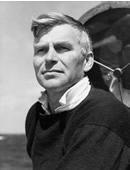



 FIDS
and the British Antarctic Survey
FIDS
and the British Antarctic Survey Fuchs returned to the Falkland Islands Dependencies Scientific Bureau in London at the end of 1958. In 1962, with the introduction of the Antarctic Treaty, the FIDS was renamed the British Antarctic Survey (BAS). As its first Director, Fuchs built up an effective team of admisitrators and set about turning the Survey into a Public Office.
The Treasury proposed the closure of the BAS, so Fuchs sought support from various Ministries, from the Royal Society, and from his now extensive network of influential contacts. The proposal to sustain the BAS was put forward for consideration by the Cabinet Office and the Survey's fate was referred to the Council for Scientific Policy, which advised that the BAS should continue given the scientific output already proven. The Council also supported the need for a new ship for the Survey. Fortunately the Cabinet agreed and the BAS was formally transferred to the National Environment Research Council in April 1967, with an annual budget of £1 million (today about £12 million). At last a sustainable structure and continuity in the scientific programmes was possible.
A variety of reserach groups that included Geophysics, Biology, Medicene and Zoology were established throughout the country, some with research stations in Antarctica. The BAS cooperated with the Scott Polar Research Institute at the University of Cambridge and in 1971 a BAS Glaciological Section was established there.
By 1971 the total number of men in the Antarctic was 92, including 45 scientists, surveyors and meterologists. By 1973 permanent staff in the UK numbered 53, increased each summer by an influx of contract staff being trained for Antarctic service, others writing up their research, and the additonal administrative staff required. In the UK it had long been planned to amalgamate the Head Office and various research groups scattered around the country, and so the transfer of the BAS to Cambridge was approved. In 1972 NERC agreed a site and sufficient funding, planning permission was granted a year later, and the BAS complex was operational by 1976.
During Fuchs's 14 years as Director, the British Antarctic Survey had undergone a transformation. By the time he retired in 1973, the total number of staff was around 350 and the annual budget around £1.5 million (equivalent to about £8 million today).With skill and vision Fuchs had guided the BAS from its political origins and emphasis on geographical exploration, to become a world leader in Antarctic research.